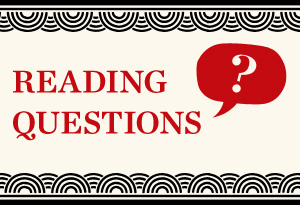Reading Questions for Great Expectations by Charles Dickens
Spoiler alert: Questions may contain spoilers

Below is the complete list of reading questions and topics for your book club discussion of Great Expectations by Charles Dickens. Click on the links below each question to share your thoughts with a world of readers.
1. In this novel, things are often not what they seem. Discuss how the theme of "expectations" is illustrated by and through the major characters in this book. How are Pip's expectations different from and similar to those of Joe Gargery, Miss Havisham, Estella and Magwitch?
Share your thoughts
2.Why do you think it is one of Magwitch's principal conditions that Pip "always bear the name of Pip" (which is actually his childhood nickname) in order to receive his financial support?
Share your thoughts
3. If Pip had not received his "great expectations" and never left Joe's forge, how do you think his life would have been different? Are the lessons he learns during his physical and emotional journey necessary for him to arrive at the wisdom he displays as the middle-aged narrator of this tale? In what ways?
Share your thoughts
4. Why do you think Miss Havisham manipulates and misleads Pip into thinking she is his secret benefactor? What, if anything, does she derive from this action?
Share your thoughts
5. Given Dickens' portrayal of Estella, what do you think attracts Pip to her in the first place, and what, when he learns of her cold-blooded manipulation of men, keeps Pip devoted to her until the end, loving her, as he says, "against reason, against promise, against peace"? (page 594)
Share your thoughts
6. In the final chapter, Estella says to Pip: "Suffering has been stronger than all other teaching." (page 834) Discuss the theme of suffering in this book—specifically how it instructs Pip, Miss Havisham and Estella.
Share your thoughts
7. In Chapter 49, Miss Havisham confesses to Pip that in adopting Estella, she "meant to save her (Estella) from misery like my own." (page 753) Do you believe this, given Dickens' harsh characterization of Miss Havisham throughout the novel?
Share your thoughts
8. In Chapter 49, when Miss Havisham is set on fire, do you believe that, given her state of mind, Dickens intends us to read this as an accident or as a kind of penance/attempted suicide on her part for her cruelty to Pip and Estella?
Share your thoughts
9.What do you think makes Pip change his opinion of his benefactor Magwitch from one of the initial repugnance to one of the deep and abiding respect and love?
Share your thoughts
10. In Chapter 59, when Pip places Joe and Biddy's son (also named Pip) on the same tombstone that opens the novel, what do you think Dickens intends to tell us with this image? Given the novel's theme of how the sins of others are visited upon us, do you view this image as a foreboding one in any way?
Share your thoughts
More from Oprah's Date with Dickens
Learn more about the novel Great Expectations
Read the biography of Charles Dickens
Get the reading discussion questions for A Tale of Two Cities
Penguin Books and Penguin Classics wish to thank and credit the following writers and books for information used in creating this Reading Group Guide:
Janice Carlisle (editor), Charles Dickens, Great Expectations: Case Studies in Contemporary Criticism, New York, Bedford Books of St. Martin's Press, 1996
Edmond Jabes, The Book of Questions (Volume 1), Middletown, CT., Wesleyan University Press, 1976
Fred Kaplan, Dickens: A Biography, New York, William Morrow & Co., Inc., 1988
Norman Page, A Dickens Chronology, Boston, MA., G.K. Hall & Co., 1988
Janice Carlisle (editor), Charles Dickens, Great Expectations: Case Studies in Contemporary Criticism, New York, Bedford Books of St. Martin's Press, 1996
Edmond Jabes, The Book of Questions (Volume 1), Middletown, CT., Wesleyan University Press, 1976
Fred Kaplan, Dickens: A Biography, New York, William Morrow & Co., Inc., 1988
Norman Page, A Dickens Chronology, Boston, MA., G.K. Hall & Co., 1988



